人教版(2019)选择性必修 第一册UNIT 4 BODY LANGUAGE复习课件(共107张PPT)
文档属性
| 名称 | 人教版(2019)选择性必修 第一册UNIT 4 BODY LANGUAGE复习课件(共107张PPT) | 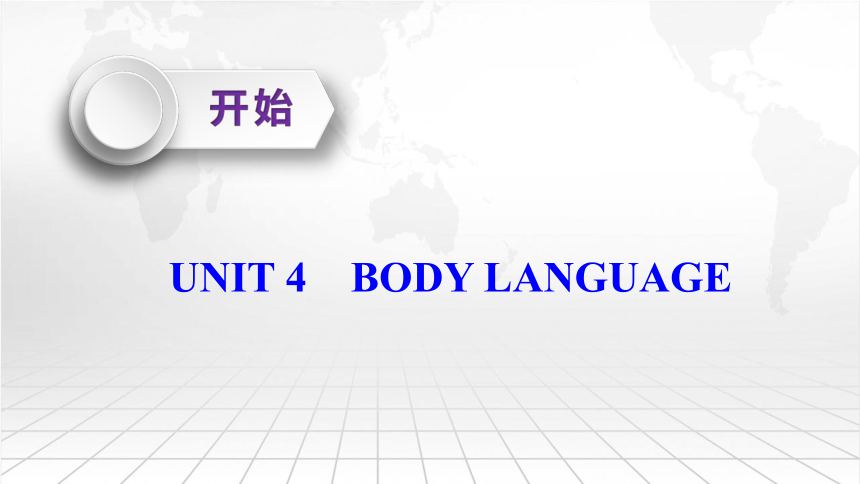 | |
| 格式 | pptx | ||
| 文件大小 | 2.1MB | ||
| 资源类型 | 教案 | ||
| 版本资源 | 人教版(2019) | ||
| 科目 | 英语 | ||
| 更新时间 | 2023-07-26 17:52:36 | ||
图片预览


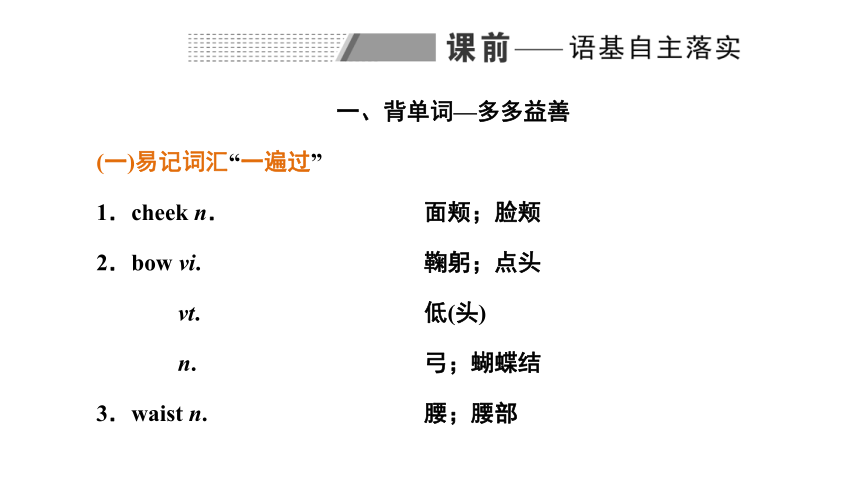
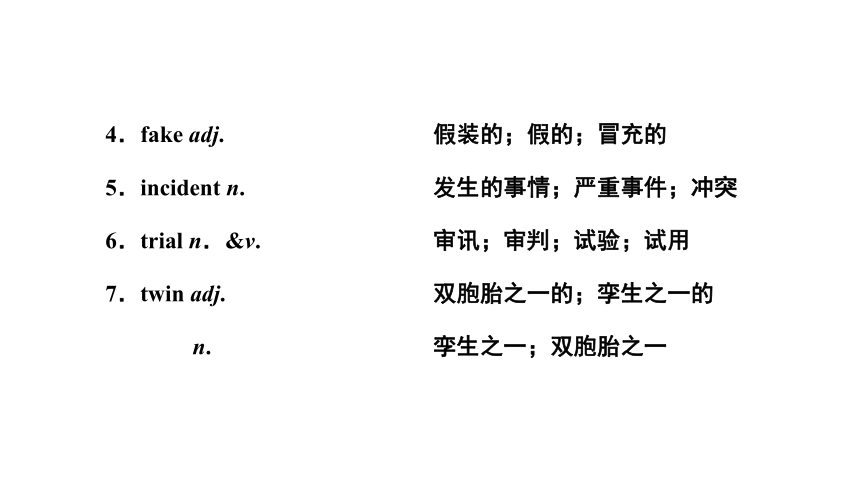
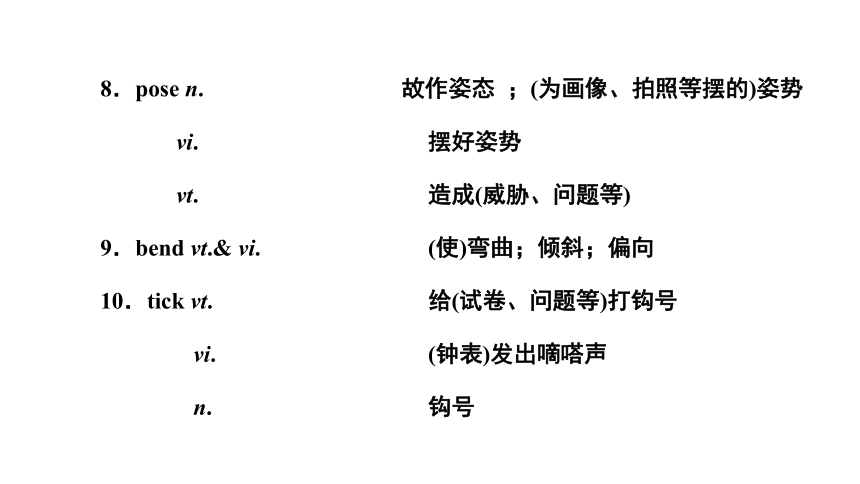
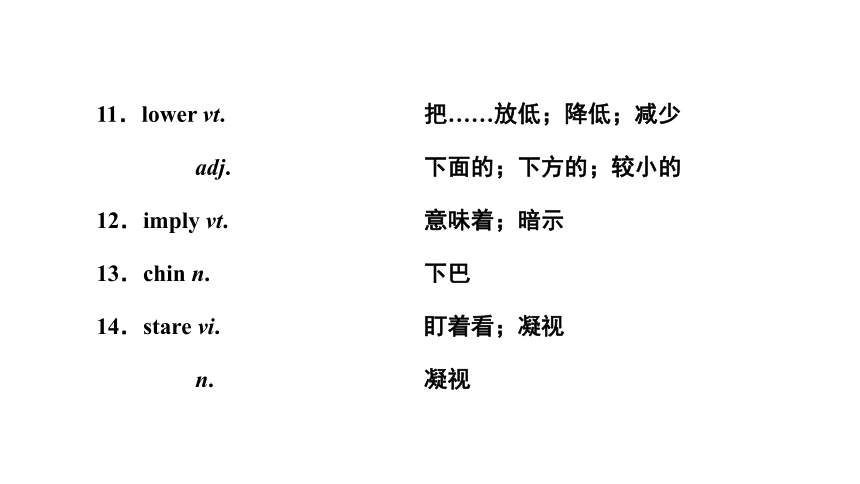
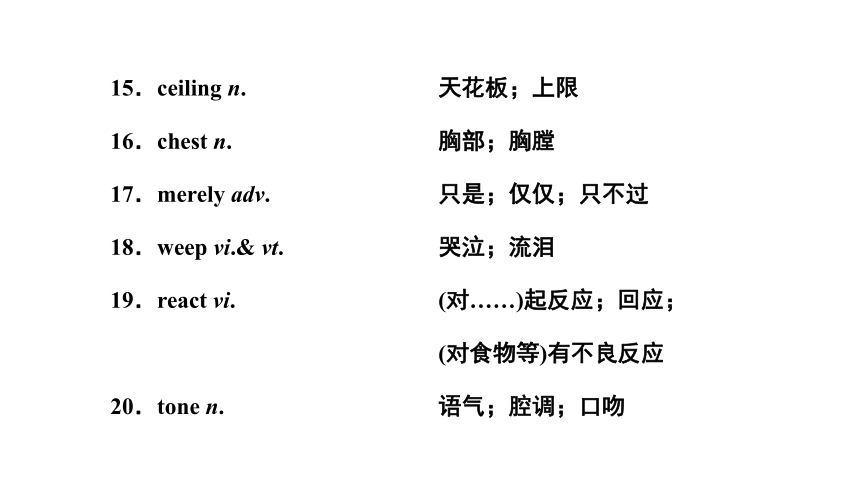
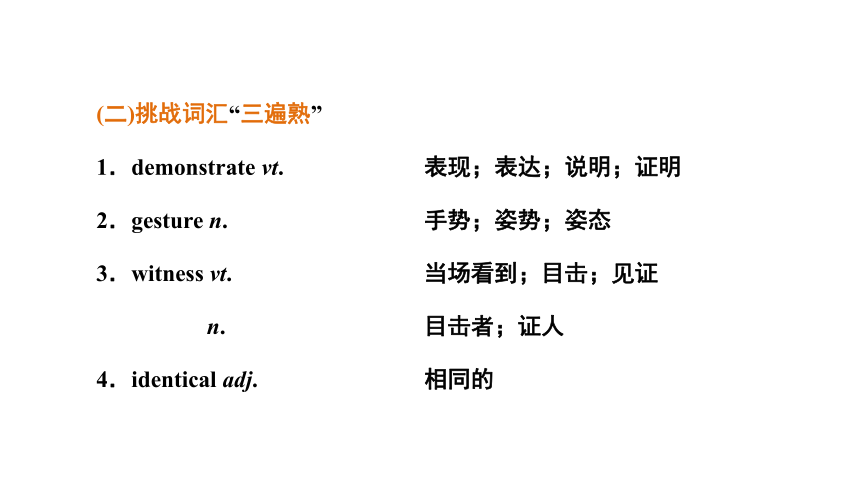
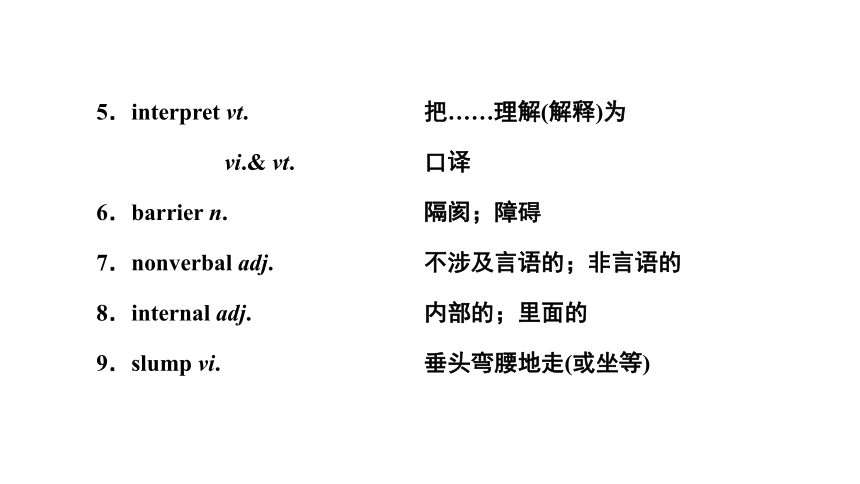
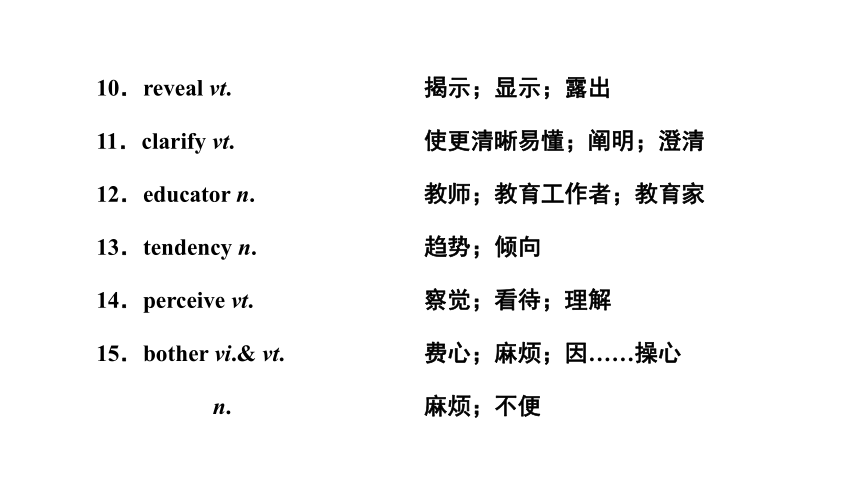
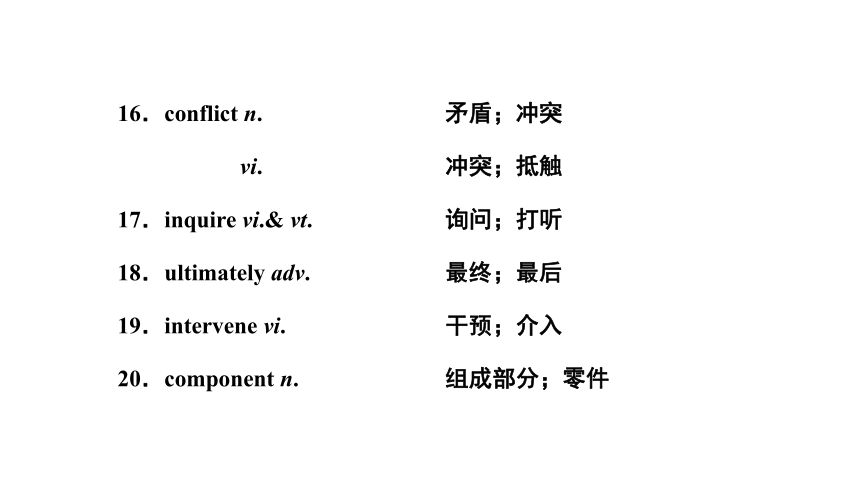
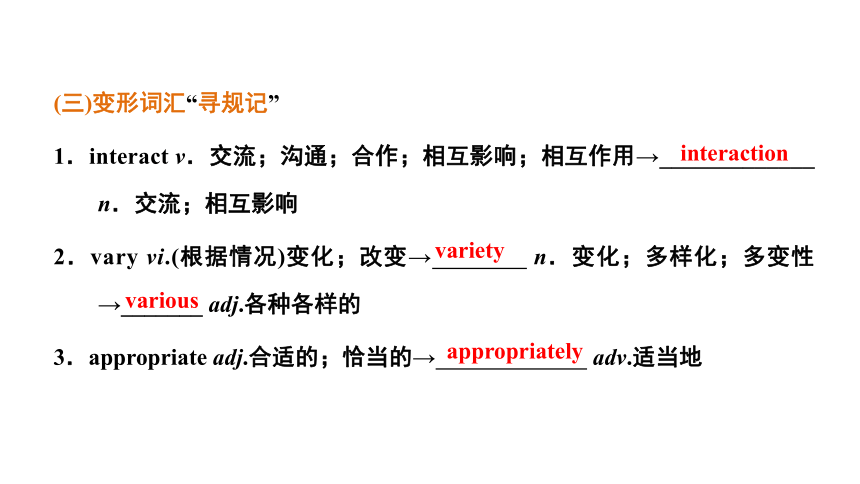
文档简介
(共107张PPT)
UNIT 4 BODY LANGUAGE
开始
01
02
03
课前——语基自主落实
课堂——能力融会发展
课下——主题素养训练
一、背单词—多多益善
(一)易记词汇“一遍过”
1.cheek n. 面颊;脸颊
2.bow vi. 鞠躬;点头
vt. 低(头)
n. 弓;蝴蝶结
3.waist n. 腰;腰部
4.fake adj. 假装的;假的;冒充的
5.incident n. 发生的事情;严重事件;冲突
6.trial n.&v. 审讯;审判;试验;试用
7.twin adj. 双胞胎之一的;孪生之一的
n. 孪生之一;双胞胎之一
8.pose n. 故作姿态 ;(为画像、拍照等摆的)姿势
vi. 摆好姿势
vt. 造成(威胁、问题等)
9.bend vt.& vi. (使)弯曲;倾斜;偏向
10.tick vt. 给(试卷、问题等)打钩号
vi. (钟表)发出嘀嗒声
n. 钩号
11.lower vt. 把……放低;降低;减少
adj. 下面的;下方的;较小的
12.imply vt. 意味着;暗示
13.chin n. 下巴
14.stare vi. 盯着看;凝视
n. 凝视
15.ceiling n. 天花板;上限
16.chest n. 胸部;胸膛
17.merely adv. 只是;仅仅;只不过
18.weep vi.& vt. 哭泣;流泪
19.react vi. (对……)起反应;回应;
(对食物等)有不良反应
20.tone n. 语气;腔调;口吻
(二)挑战词汇“三遍熟”
1.demonstrate vt. 表现;表达;说明;证明
2.gesture n. 手势;姿势;姿态
3.witness vt. 当场看到;目击;见证
n. 目击者;证人
4.identical adj. 相同的
5.interpret vt. 把……理解(解释)为
vi.& vt. 口译
6.barrier n. 隔阂;障碍
7.nonverbal adj. 不涉及言语的;非言语的
8.internal adj. 内部的;里面的
9.slump vi. 垂头弯腰地走(或坐等)
10.reveal vt. 揭示;显示;露出
11.clarify vt. 使更清晰易懂;阐明;澄清
12.educator n. 教师;教育工作者;教育家
13.tendency n. 趋势;倾向
14.perceive vt. 察觉;看待;理解
15.bother vi.& vt. 费心;麻烦;因……操心
n. 麻烦;不便
16.conflict n. 矛盾;冲突
vi. 冲突;抵触
17.inquire vi.& vt. 询问;打听
18.ultimately adv. 最终;最后
19.intervene vi. 干预;介入
20.component n. 组成部分;零件
(三)变形词汇“寻规记”
1.interact v.交流;沟通;合作;相互影响;相互作用→_____________ n.交流;相互影响
2.vary vi.(根据情况)变化;改变→ n.变化;多样化;多变性→_______ adj.各种各样的
3.appropriate adj.合适的;恰当的→ adv.适当地
interaction
variety
various
appropriately
4.approve vi.赞成;同意vt.批准;通过→ n.同意;赞成→___________ v.不同意
5.employ vt.使用;应用;雇用→ n.雇主→ n.雇员;雇工→ n.雇用;使用;就业
6.differ vi.相异;不同于→ adj.不同的→ n.差异;不同
approval
disapprove
employer
employee
employment
different
difference
7.favour vt.较喜欢;选择;有利于n.帮助;恩惠;赞同→ adj.赞成的;支持的;有利的
8.anger n.愤怒;怒气 vt.使生气;激怒→ adj.生气的
9.rely v.依赖;依靠→ adj.可靠的;可信赖的
10.slight adj.轻微的;略微的;细小的→ adv.略微;稍微
favourable
angry
reliable
slightly
11.assess vt.评估;评价→ n.评价;评定
12.bare adj.赤裸的;勉强的→ adv.几乎不;勉强才能;刚刚
13.occupy vt.占据;占用→ n.工作;职业;占领;占用
14.distract vt.分散(注意力);使分心→ n.使人分心的事物;消遣;娱乐
assessment
barely
occupation
distraction
15.distinguish vi.& vt.区分;辨别→ adj.著名的;卓越的;杰出的
16.anxiety n.焦虑;担心;害怕→ adj.焦虑的;渴望的→________ adv.焦急地;担忧地
17.embarrass vt.使窘迫;使尴尬;使为难→ adj.难堪的;尴尬的→ adj.令人难堪的;令人尴尬的→_____________ n.窘迫;尴尬;难堪
distinguished
anxious
anxiously
embarrassed
embarrassing
embarrassment
18.shame n.羞耻;羞愧→ adj.羞愧;惭愧→ adj.可耻的;不道德的→ adj.无耻的
19.adjust vt.调整;调节vi.& vt.适应;(使)习惯→ n.调整;适应→ adj.可调节的
ashamed
shameful
shameless
adjustment
adjustable
(四)联想词汇“一线牵”
1.“赞成”与“反对”对比记
①approve v. 批准;赞同
②favour vt. 赞成
③support vt. 支持
④oppose vt. 反对
⑤object vi. 反对
2.控制情绪少“生气”
①angry adj. 生气的
②anger n. 愤怒;怒气
③annoy vt. 使……不悦
④annoyed adj. 生气的
⑤annoying adj. 使人烦恼的
3.“情绪”多变要留意
①embarrassed adj. 难堪的;尴尬的
②delighted adj. 欣喜的
③bored adj. 厌烦的
④disappointed adj. 失望的
⑤depressed adj. 沮丧的
二、背词块—丰富表达
1. 从……到……不等
2. 相比之下
3. 往下看;俯视
4. (与……)相比较
5. 推理;推断
vary from ...to ...
by contrast
look down
by comparison
make inferences
6. 消除;分解;打破
7. 访问;要求;正式邀请
8. 度过;熬过;完成;使理解;使明白
9. 做出评估
10. 把……比作
break down
call on
get through
make assessments
be compared to
11. 换句话说;也就是说
12. 同时
13. 有某种影响;在工作
14. 以……为基础/根据
15. 提出
in other words
at the same time
at work
be based on
come up with
[联想串记]
1.“look+介/副词”相关短语
look down 往下看;俯视
look down upon/on 瞧不起;轻视
look into 调查;了解
look up 抬头看;查阅;查找
look up to (sb.) 仰视;尊敬;赞赏(某人)
look forward to 盼望;期待
look back on/at 回顾;回想(某事)
look ahead (to sth.) 展望未来;为将来设想
2.“动词+through”相关短语
get through 度过;熬过;完成;使理解;使明白
glance through 匆匆看一遍
go through 通过;经受;仔细检查
look through 快速查看;浏览;翻阅
see through 看穿;识破
三、背好句好段—增分写作
(一)背好句—有“话”好好说
1.as引导的原因状语从句
教材原句 However, you should avoid making this gesture in Brazil and Germany, as it is not considered polite.
然而,在巴西和德国,你应该避免作出这一手势,因为这是一个被视为不礼貌的手势。
推荐佳句 ①We must have confidence, as it is the key to winning the match.
我们必须要有信心,因为这是赢得比赛的关键。
②As you are good at table tennis, you are condemned to be the most suitable person.
因为你擅长乒乓球,你注定会是最合适的人选。
续表
2.部分否定
教材原句 Of course, not everyone who looks up is paying attention in class.
当然,不是所有抬着头的学生都是在认真听课。
推荐佳句 ①(新教材译林版必修2佳句)I did not understand all of the traditional customs, but a few made a deep impression on me.
不是所有的传统习俗我都了解,但有一些给我留下了深刻的印象。
②The proverb reminded me that the path to success was not always smooth.这句谚语提醒了我:通往成功的道路并不总是一帆风顺。
3.have+宾语+宾语补足语
教材原句 Students who are angry, afraid, or experiencing anxiety may have their arms crossed in front of their chests and their legs closed or crossed, like they are guarding their bodies.
愤怒、害怕或焦虑的学生会双臂交叉放在胸前,双腿并拢或交叉,像是在保护自己的身体。
推荐佳句 ①She had her feet hurt when climbing the mountain.
爬山时,她的脚受伤了。
②Please don't have the students disturbed while they are reviewing their lessons.
请不要让学生在复习功课时受到打扰。
续表
(二)背好段—有“情”慢慢聊
情感表达之“满意”
I gave her a hopeful smile, wiping my eyes with the back of my hand. “A magical flying truck! I bet it could get there even faster than my canoe!” Inspired by her fancy, I started to tell how my flying truck would go through the sky and arrive there. Content in the sunlight, with my toes in the mud, I listened to Marie and let our imaginations run far, far away.
我给了她一个满怀希望的微笑,用手背擦了擦眼睛。“一辆神奇的飞行卡车!我打赌它到达那里的速度比我的独木舟还快!”在她的想象的启发下,我开始讲述我的飞行卡车将如何穿过天空到达那里。我心满意足地徜徉在阳光下,脚趾踩在泥里,听着玛丽的歌,让我们的想象跑得很远很远。
[点评] 本段中使用了“a hopeful smile, Inspired by her fancy, Content in the sunlight”等词块来描述人物满意的心情,生动形象。常用的表示“满意”的词汇有:satisfy,be satisfied with, content,be content with, be pleased with, be filled with pride等。
四、语基课前自查——摸底训练
Ⅰ.单词拼写
1.Jackson gave me an (合适的) description of what he had experienced in Africa.
2.Having (阐明) his opinion of the incident, Mr Smith sat down and listened to others'.
3.An (严重事件) was prevented by the timely arrival of the police.
appropriate
clarified
incident
4.So I have no choice but to (麻烦) you to correct my mistakes in my essay.
5.Lack of confidence is one of the main (障碍) to his success.
6.Thanks very much for your help.I'll return the (恩惠) some time.
7.She found herself in (冲突) with her parents over her future career in fashion design.
bother
barriers
favour
conflict
8.The past ten years have (目睹) a boom in economy in my hometown, as a result of which people here are enjoying a far better life than before.
9.She was deeply (羞愧) of her behaviour at the party.
10.She has refused to (透露) the whereabouts (行踪) of her daughter.
witnessed
ashamed
reveal
Ⅱ.单句语法填空
1.Barbara is in her late forties and has a (tend) to complain about what she doesn't feel content with.
2.According to the research, many (educate) strongly oppose protecting children too much.
3.It's necessary for you to make your child know that you expect him to act ____________(appropriate) toward other people.
tendency
educators
appropriately
4.I can introduce Chinese painting to our (distinguish) guests efficiently while offering them constructive guidance.
5.The majority of people in this area have no access to a (rely) water supply in the dry season.
6.The government has taken effective measures to create more_____________(employ) opportunities.
distinguished
reliable
employment
7.When learning his friend had moved to a (slight) older house, he was depressed and full of (anxious).
8.In China,smiling is not only an expression of happiness,but also a way to avoid being (embarrass).
slightly
anxiety
embarrassed
9.(2021·浙江1月高考)With the pumpkin resting on the table, hole uppermost, I (bend) over and pressed my head against the opening.
10. (occupy) in his research,he didn't have time to go on holiday to relax himself.
bent
Occupied
Ⅲ.选词填空
1.She seems slimmer with her sister.
2.He had to lower his head to the door.
3.Her plane and it was 18 hours before she got there.
vary from ...to, by contrast, make inferences, break down, call on, get through, in other words, come up with
by contrast
get through
broke down
4.Wedding traditions and customs one country another.
5.He is a man who you can trust. ,he is a reliable man.
6.You can about results according to the clue of the story.
7.I want to my junior teacher next week.
8.He racked his brains for a long time but couldn't a solution.
vary from
to
In other words
make inferences
call on
come up with
Ⅳ.多维表达
1.(完成句子)他明天想去检查眼睛。(have+宾语+过去分词)
He wants to tomorrow.
2.(完成句子)随着中国农历新年的临近,我送你一个中国结作为礼物。(as)
,I will send you a Chinese knot as a gift.
have his eyes examined
As Chinese Lunar New Year is approaching
3.(一句多译)不是每一个人都能将现实和幻想区分开来。(部分否定)
① reality from fantasy.
② reality from fantasy.
4.While he met many barriers, he managed to get through this project.
→ ,he managed to get through this project.(状语从句的省略)
Not everyone can distinguish
Everyone can't distinguish
While meeting many barriers
中档保分词汇—自查自纠无盲点
1.witness vt.当场看到;目击;见证n.目击者;证人
(单句语法填空/句型转换)
①(2020·新高考全国卷Ⅰ)However, her children have learned an important lesson (witness) their mother earn her degree.
witnessing
②Anyone who witnessed to (see) the accident yesterday should call the police.
③We all had a really enjoyable time in the tea house.
→The tea house for all of us.
seeing
witnessed a really enjoyable time
系统归纳 (1)witness sth. 目击/目睹某事
witness to (doing) sth. 为(做)某事作证
(2)be (a) witness to sth. 某事的目击者
微点提醒 witness 作动词且后接to时,to用作介词,后接名词或动词-ing形式。
2.appropriate adj.合适的;恰当的
(单句语法填空/完成句子)
①For the interview itself you should dress smartly and_______________ (appropriate).
②As for me, I don't think it their jobs in order to provide better conditions for their children.
在我看来,我认为父母为了给他们的孩子提供更好的条件而放弃工作是不合适的。
appropriately
is appropriate for parents to quit
③ his music should be played at this festival.
他的音乐在这个节日里演奏是完全适合的。
系统归纳 (1)be appropriate to/for 适合于
be appropriate to do sth. 做某事是合适的
It is appropriate that sb.(should) do ... 某人做……是合适的
(2)appropriately adv. 适当地
It is entirely appropriate that
3.conflict n.矛盾;冲突vi.冲突;抵触
(完成句子)
①Putting ourselves in their shoes is of great significance when we .
当我们和朋友发生冲突的时候,换位思考是十分重要的。
②Your statement is other evidence.
你的陈述与其他证据相冲突。
conflict with friends
in conflict with
③You should avoid your parents.
你应该避免和你的父母发生冲突。
系统归纳 (1)in conflict with ... 和……有矛盾/不一致
come into conflict with ... 与……产生矛盾;与……有分歧
(2)conflict with ... 与……相冲突
coming into conflict with
4.in other words换句话说;也就是说
(用word的相关短语完成句子)
① ,learning English is not only necessary but also important.
总之,学习英语不仅是必要的,而且是重要的。
②However it may be, I shall .
无论如何,我都将遵守诺言。
In a word
keep my word
③Hearing the story, we were moved .
听了这个故事,我们被感动得难以言表。
④He has made another mistake. ,he has to leave the company.
他又犯了一个错误。换句话说,他不得不离开这个公司。
beyond words
In other words
系统归纳 in a/one word 总之;简言之
keep one's word 遵守诺言
break one's word 失信
have a word with ... 与……谈一谈
have words with ... 与……拌嘴/争吵
beyond words 无法用言语表达
5.break down消除;分解;打破;(身体)垮掉
(写出下列句中break down的含义/单句语法填空)
①You should break down your methods so that each method does a particular task._____
②If Tom carries on working like this, he will break down sooner or later.
__________
分解
(身体)垮掉
③As far as I'm concerned, marriage based on money is bound to break .
④She is trying to break from the bad habit, which makes her parents happy.
up
away
系统归纳 break away from 脱离(政党);打破(陈规、陋习)
break in 打断(谈话);插嘴;闯入
break into 强行闯入;突然开始
break out (战争、火灾等)爆发
break up 解散;粉碎;(关系等)破裂
教材基础语法—再认再现基础牢
1.动词-ing形式作宾语
(单句语法填空/完成句子)
①She feels like (go) abroad for further education next year.
②I often practise (listen) and (speak).
③The boy was lucky to escape (punish).
going
listening
speaking
being punished
④We don't allow (dive) in the pool.
⑤He likes but he doesn't like this afternoon.(swim)
⑥Learning that a Chinese painting exhibition will be held, I .
听说要举办一个中国画展览,我忍不住想做一名志愿者。
⑦I have never .
我从未梦想过要参观那个地方。
diving
swimming
to swim
can't help being a volunteer
dreamed of visiting that place
2.动词-ing形式作表语
(单句语法填空/完成句子)
①The argument is very (convince).
②The news that you will come to China this summer vacation is__________ (excite).
③Her job is (keep) the lecture hall as clean as possible.
convincing
exciting
keeping
④What has made him unhappy is .
让他不高兴的是他弄丢了他最喜欢的自行车。
⑤ ,it will surely interest the readers.
我们都认为如果一本书有趣的话,它就一定能吸引读者。
losing his favourite bike
We all believe that if a book is interesting
[谨记规则]
1.常接动词-ing形式作宾语的动词可用下面的口诀帮助记忆:
避免错过少延期(avoid, miss, postpone)
建议完成多练习(advise/suggest, finish, practise)
喜欢想象禁不住(enjoy, imagine, can't help)
承认否定与嫉妒(admit, deny, envy)
逃避冒险莫原谅(escape, risk, excuse)
忍受保持不介意(stand, keep, mind)
2.love, hate, prefer, like等动词后接动词-ing形式作宾语指经常性的动作,用不定式作宾语指具体的动作。
3.现在分词作表语,往往具有形容词的性质,说明主语的性质、特征等。作表语的现在分词,多是由能够表示人们某种感情或情绪的动词变化而来的。常见的有:moving, interesting, encouraging, exciting, inspiring, boring, surprising, puzzling, amusing, astonishing ...这类分词有“令人……的”的含义,常修饰物。
4.动名词作表语多表示抽象性的或习惯性的动作,一般说明主语的内容。
复杂多变词汇—条分缕析逐点清
1.vary vi.(根据情况)变化;改变
常见考法 (1)vary from ...to ... 从……到……不等
vary in ... 在……(大小、形状等)上不同
vary with 随……变化/改变
(2)variety n. 多种多样
a variety of/varieties of 各种各样的
(3)various adj. 各种各样的
升维考法 vary in中的介词in,表示“在……方面”。vary with中的介词with,表示“随着”。
续表
?精练常见考法(单句语法填空/词汇、句式升级)
①The women stared at pictures varying large ones to small ones.
② Our school has built a new stadium.It has all kinds of well-equipped facilities.
→Our school has built a new stadium,________________________________
.(升级加蓝词;定语从句)
from
which has various/varieties of/a
variety of well-equipped facilities
?细练升维考法(单句语法填空)
③These books vary the contents, so you can choose one according to your taste.
④As far as I know,the restaurant's menu varies the season.
in
with
2.approve vi.赞成;同意vt.批准;通过
常见 考法 (1)approve sth. 批准/通过某事
approve of (sb./sb.'s) doing sth. 赞同/同意(某人)做某事
(2)approval n. 赞成;同意;批准
get one's approval 得到某人的同意
give one's approval to 同意;批准
升维 考法 approve 作“行政部门的通过”时,为及物动词;作“获取他人同意”时,为不及物动词,其后要与of连用。
?精练常见考法(单句语法填空)
①I approve of your (try) to earn some money, but please don't neglect your study.
②After a heated discussion,the teacher finally gave his (approve) to us making a video to record our experiences at school.
trying
approval
?细练升维考法(完成句子)
③The company by a majority of ninety-nine.
该公司以99票的多数票通过了这项计划。
④You made a good decision,and I thoroughly .
你做了一个好的决定,我完全同意它。
approved the plan
approve of it
3.differ vi.相异;不同于
常见考法 (1)differ from 与……不同/有区别
differ in 在……方面不同
(2)different adj. 不同的;有差异的
be different from 与……不同
(3)difference n. 不同(之处);差别;分歧
make a difference 有影响;起作用
make no difference 没影响
升维考法 differ一词的重音在第一个音节上,因此其现在分词、过去式和过去分词直接加-ing或-ed。differ为不及物动词,没有被动语态。
?精练常见考法(语段填空/单句语法填空)
①They are twins but they are (与……不同) each other in their habits and they also (与……不同) each other in many behaviours.But it (不影响) to their life.
②There is no denying that customs (different) in different countries.
different from
differ from
makes no difference
differ
③What he had said made diffidence to the boy.He changed into a quite ________(differ) one.
?细练升维考法(单句语法填空)
④ (differ) from that of his boss,his practical idea was rejected.
a
different
Differing
4.reliable adj.可靠的;可信赖的
常见考法 rely on/upon sb./sth. 指望某人/某物
rely on/upon sb.to do sth. 指望/相信某人会做某事
rely on sb./sb.'s (doing) sth. 依赖/信任/指望某人(做)某事
rely on/upon sb.for 指望/依靠某人获得……
rely on it that ... 相信……;指望……
升维考法 句式rely on it that ...中it是形式宾语,that ...是真正的宾语。其中的 it 习惯上不可省略。
?精练常见考法(单句语法填空)
①These days we rely heavily on computers (organize) our work.
②We students rely on parents necessary living items.
③Many people now would rely on (surf) the Internet rather than read newspapers for news.
to organize
for
surfing
?细练升维考法(一句多译)
你可以相信当你在困难时我会帮助你。
④You can you when you are in trouble.
⑤You can you when you are in trouble.
⑥You can when you are in trouble.
rely on me to help
rely on it that I will help
rely on my helping you
经典增分句式—学通用活表达美
1.部分否定
(1)表示“全部”意义的词汇(both,all,everyone,everything,everywhere,always等)与否定词(not等)连用,表示部分否定,翻译为“并非都/总是……”。
(2)全部否定的使用方法:either与否定词not连用或直接使用相对应的否定词neither/none/nobody(no one)/nothing/nowhere/never等。
?通过句式变换明晰句式结构
①Not all the students have passed the tests.
→ ____________________________________
②It's impossible for all the applicants to get the jobs, because all of them aren't fit for the jobs.
→It's impossible for all the applicants to get the jobs, because .
All the students haven't passed the tests.
not all of them are fit for the jobs
?通过句子仿写做到学通写美
③遗憾的是,并不是你班里的每一个学生都会成功。
Unfortunately,___________________________________________________
in your class.
④这位老人并非总是晚饭后去公园散步。
The old man in the park after supper.
not every student will succeed/every student won't succeed
doesn't always go for a walk
2.have+宾语+宾语补足语
have/has在此结构中是使役动词,表示“使……发生/做,使……被做”,宾语补足语根据与宾语之间的逻辑关系使用(to) do, doing, done。
(1)“have/get+宾语+done”可以表示两种含义:“让别人做某事”或“遭遇到某种不幸”。
(2)have+宾语+do “使/让……做某事”。
(3)have+宾语+doing sth.“使/让……持续做某事”。
?通过句式变换明晰句式结构
①I couldn't accompany you to the bookstore on Friday afternoon because my foot was injured.
→I couldn't accompany you to the bookstore on Friday afternoon because .
I had my foot injured
?通过句子仿写做到学通写美
②为了确保安全,你最好定期检查一下你的电器。
You'd better regularly to ensure safety.
③不要让这匹马一整天不停地干活。
Don't all the day.
④主任让她的助手为会议准备了一些材料。
The director some materials for the meeting.
have your appliances examined
have the horse working
had her assistant prepare
2021·全国甲卷·阅读理解D篇
Who is a genius This question has greatly interested humankind for centuries.
Let's state clearly: Einstein was a genius.His face is almost the international symbol for genius.But we want to go beyond one man and explore the nature of genius itself.Why is it that some people are so much more intelligent or creative than the rest of us And who are they
In the sciences and arts, those praised as geniuses were most often white men, of European origin.Perhaps this is not a surprise.It's said that history is written by the victors, and those victors set the standards for admission to the genius club.When contributions were made by geniuses outside the club — women, or people of a different color or belief — they were unacknowledged and rejected by others.
A study recently published by Science found that as young as age six, girls are less likely than boys to say that members of their gender (性别) are “really, really smart.” Even worse, the study found that girls act on that belief: Around age six they start to avoid activities said to be for children who are “really, really smart.” Can our planet afford to have any great thinkers become discouraged and give up It doesn't take a genius to know the answer: absolutely not.
Here's the good news.In a wired world with constant global communication, we're all positioned to see flashes of genius wherever they appear.And the more we look, the more we will see that social factors (因素) like gender, race, and class do not determine the appearance of genius.As a writer says, future geniuses come from those with “intelligence, creativity, perseverance (毅力), and simple good fortune, who are able to change the world.”
[真题再做]
语篇解读:本文是一篇说明文。文章主要介绍了过去人们对天才的定义标准存在着诸如性别、种族和信仰等歧视,随着越来越多来自各地的天才为人所知,人们对天才的固有认知将被打破。
1.What does the author think of victors' standards for joining the genius club
A.They're unfair. B.They're conservative.
C.They're objective. D.They're strict.
答案:A
解析:观点态度题。根据第三段最后一句可知,当女性、有色人种、持不同信仰的人对社会做出贡献后,他们得不到认可并受到排斥。作者认为那些“胜利者”对于进入“天才俱乐部”设置的标准是不公平的。
2.What can we infer about girls from the study in Science
A.They think themselves smart.
B.They look up to great thinkers.
C.They see gender differences earlier than boys.
D.They are likely to be influenced by social beliefs.
答案:D
解析:推理判断题。根据第四段第二句可推测,女孩很可能受到整个社会信念的影响。act on意为“依据……行事”。
3.Why are more geniuses known to the public
A.Improved global communication.
B.Less discrimination against women.
C.Acceptance of victors' concepts.
D.Changes in people's social positions.
答案:A
解析:细节理解题。根据最后一段第二句可知,如今越来越多的天才为公众所知,是由于网络的发展,全球通信交流得到改善。
4.What is the best title for the text
A.Geniuses Think Alike
B.Genius Takes Many Forms
C.Genius and Intelligence
D.Genius and Luck
答案:B
解析:标题归纳题。根据最后一段第三句可知,作者认为性别、种族、阶层这些外在社会因素不是天才出现的决定性因素。同时综合全文可知,本文旨在告诉人们,天才没有唯一的外在标准或“规格”,拥有智慧、创造力、毅力,并能改变世界的人就是天才。
[素养发掘]
一、由典题悟通法
观点态度题的思维建模(第1题)
思维建模 模型应用
第一步:明要求 根据题干确定问的是谁对什么的态度 提炼题干关键信息the author think of victors' standards for joining the genius club, 可以确定问的是:对于加入天才俱乐部的胜利者的标准,作者有什么看法?
第二步:抓关键 作者观点和文章主旨关系密切,同时关注引述性语言的态度倾向 由第三段最后一句可知,当女性、有色人种、持不同信仰的人对社会做出贡献后,他们得不到认可并受到排斥。
第三步:定选项 对文章信息综合分析,客观推断人物态度 第三段前两句提到欧洲血统的人被赞誉为“天才”理所当然(not a surprise),与该段最后一句话形成对比,可以推知作者认为那些“胜利者”对于进入“天才俱乐部”设置的标准是不公平的。故选A。
续表
二、由语篇积词汇
1.因境辨义(写出下列蓝体词在文中的意思)
①(一词多义)Let's state clearly: Einstein was a genius. His face is almost the international symbol for genius.___________
②(熟词生义)But we want to go beyond one man and explore the nature of genius itself._____
陈述;说明
本质
③(一词多义)Why is it that some people are so much more intelligent or creative than the rest of us?_________
④(熟词生义)In a wired world with constant global communication, we're all positioned to see flashes of genius wherever they appear.
______________________
余下的人
把……放在适当的位置
2.词块积累(写出下列词块的汉语意思)
①go beyond ___________
②of European origin _____________
③set the standards for _______________
④make contributions _________
超出;超越
有欧洲血统的
为……制定标准
做出贡献
⑤even worse ___________
⑥act on ______________________
⑦afford to do sth. _______________
⑧give up _____
更糟糕的是
根据(建议、信息等)行事
承担得起做某事
放弃
三、寻结构破长句
1.It's said that history is written by the victors, and those victors set the standards for admission to the genius club.
抓标志:连接词 ;并列连词____
判类型:复合句(含有一个主语从句)+并列连词+简单句
试翻译: ,历史是由胜利者书写的,并且那些胜利者为天才俱乐部设立了准入标准。
that
and
据说
2.A study recently published by Science found that as young as age six, girls are less likely than boys to say that members of their gender are “really, really smart.”
抓标志:连接词_________
判类型:主句(含有分词短语作定语)+宾语从句(含有一个宾语从句)
试翻译:《科学》杂志 一项研究发现,在6岁时,女孩比男孩更不可能说自己性别的成员“非常非常聪明。”
that; that
最近发表的
四、赏佳句助写作
1.(赏结构之美)Why is it that some people are so much more intelligent or creative than the rest of us
赏析:句子用强调句型的特殊疑问句形式(特殊疑问词+is/was it that/who ...)提出设问,突出了文章的核心内容——天才比我们其他人优秀的原因是什么。给人以深刻印象,启发读者的思考。
[对点练——完成句子/句型转换]
① they managed to finish the work in such a short time
他们究竟是怎样在如此短的时间设法完成工作的?
②Your creative talents can also be put to good use, if you can work up the energy.(用强调句型的特殊疑问句对加蓝部分提问)
→________________________________________________________
How was it that
How is it that your creative talents can also be put to good use
2.(赏用词之美)But we want to go beyond one man and explore the nature of genius itself.
赏析:作者运用go beyond(超越), explore(探索), nature(本质)准确有力地表达了我们将不局限于某一个人去探索天才本身的本质,而人们对天才的固有认知将被打破。
3.(赏意境之美)As a writer says, future geniuses come from those with “intelligence, creativity, perseverance, and simple good fortune, who are able to change the world.”
赏析:什么是天才的特质?拥有智慧、创造力、毅力和简单的好运气,能够改变世界。一句话简洁概括了天才的特质,给人以深刻印象。
4.(赏修辞之美)Can our planet afford to have any great thinkers become discouraged and give up It doesn't take a genius to know the answer: absolutely not.
赏析:作者采用设问的手法先提出问题,然后自己回答:absolutely not(绝对不会),否定了不公平的天才标准,引起读者思考和重视,让读者更深入地领会主题。
“课时跟踪检测”见“课时跟踪检测(四)”
(单击进入电子文档)
谢
谢
观
看
UNIT 4 BODY LANGUAGE
开始
01
02
03
课前——语基自主落实
课堂——能力融会发展
课下——主题素养训练
一、背单词—多多益善
(一)易记词汇“一遍过”
1.cheek n. 面颊;脸颊
2.bow vi. 鞠躬;点头
vt. 低(头)
n. 弓;蝴蝶结
3.waist n. 腰;腰部
4.fake adj. 假装的;假的;冒充的
5.incident n. 发生的事情;严重事件;冲突
6.trial n.&v. 审讯;审判;试验;试用
7.twin adj. 双胞胎之一的;孪生之一的
n. 孪生之一;双胞胎之一
8.pose n. 故作姿态 ;(为画像、拍照等摆的)姿势
vi. 摆好姿势
vt. 造成(威胁、问题等)
9.bend vt.& vi. (使)弯曲;倾斜;偏向
10.tick vt. 给(试卷、问题等)打钩号
vi. (钟表)发出嘀嗒声
n. 钩号
11.lower vt. 把……放低;降低;减少
adj. 下面的;下方的;较小的
12.imply vt. 意味着;暗示
13.chin n. 下巴
14.stare vi. 盯着看;凝视
n. 凝视
15.ceiling n. 天花板;上限
16.chest n. 胸部;胸膛
17.merely adv. 只是;仅仅;只不过
18.weep vi.& vt. 哭泣;流泪
19.react vi. (对……)起反应;回应;
(对食物等)有不良反应
20.tone n. 语气;腔调;口吻
(二)挑战词汇“三遍熟”
1.demonstrate vt. 表现;表达;说明;证明
2.gesture n. 手势;姿势;姿态
3.witness vt. 当场看到;目击;见证
n. 目击者;证人
4.identical adj. 相同的
5.interpret vt. 把……理解(解释)为
vi.& vt. 口译
6.barrier n. 隔阂;障碍
7.nonverbal adj. 不涉及言语的;非言语的
8.internal adj. 内部的;里面的
9.slump vi. 垂头弯腰地走(或坐等)
10.reveal vt. 揭示;显示;露出
11.clarify vt. 使更清晰易懂;阐明;澄清
12.educator n. 教师;教育工作者;教育家
13.tendency n. 趋势;倾向
14.perceive vt. 察觉;看待;理解
15.bother vi.& vt. 费心;麻烦;因……操心
n. 麻烦;不便
16.conflict n. 矛盾;冲突
vi. 冲突;抵触
17.inquire vi.& vt. 询问;打听
18.ultimately adv. 最终;最后
19.intervene vi. 干预;介入
20.component n. 组成部分;零件
(三)变形词汇“寻规记”
1.interact v.交流;沟通;合作;相互影响;相互作用→_____________ n.交流;相互影响
2.vary vi.(根据情况)变化;改变→ n.变化;多样化;多变性→_______ adj.各种各样的
3.appropriate adj.合适的;恰当的→ adv.适当地
interaction
variety
various
appropriately
4.approve vi.赞成;同意vt.批准;通过→ n.同意;赞成→___________ v.不同意
5.employ vt.使用;应用;雇用→ n.雇主→ n.雇员;雇工→ n.雇用;使用;就业
6.differ vi.相异;不同于→ adj.不同的→ n.差异;不同
approval
disapprove
employer
employee
employment
different
difference
7.favour vt.较喜欢;选择;有利于n.帮助;恩惠;赞同→ adj.赞成的;支持的;有利的
8.anger n.愤怒;怒气 vt.使生气;激怒→ adj.生气的
9.rely v.依赖;依靠→ adj.可靠的;可信赖的
10.slight adj.轻微的;略微的;细小的→ adv.略微;稍微
favourable
angry
reliable
slightly
11.assess vt.评估;评价→ n.评价;评定
12.bare adj.赤裸的;勉强的→ adv.几乎不;勉强才能;刚刚
13.occupy vt.占据;占用→ n.工作;职业;占领;占用
14.distract vt.分散(注意力);使分心→ n.使人分心的事物;消遣;娱乐
assessment
barely
occupation
distraction
15.distinguish vi.& vt.区分;辨别→ adj.著名的;卓越的;杰出的
16.anxiety n.焦虑;担心;害怕→ adj.焦虑的;渴望的→________ adv.焦急地;担忧地
17.embarrass vt.使窘迫;使尴尬;使为难→ adj.难堪的;尴尬的→ adj.令人难堪的;令人尴尬的→_____________ n.窘迫;尴尬;难堪
distinguished
anxious
anxiously
embarrassed
embarrassing
embarrassment
18.shame n.羞耻;羞愧→ adj.羞愧;惭愧→ adj.可耻的;不道德的→ adj.无耻的
19.adjust vt.调整;调节vi.& vt.适应;(使)习惯→ n.调整;适应→ adj.可调节的
ashamed
shameful
shameless
adjustment
adjustable
(四)联想词汇“一线牵”
1.“赞成”与“反对”对比记
①approve v. 批准;赞同
②favour vt. 赞成
③support vt. 支持
④oppose vt. 反对
⑤object vi. 反对
2.控制情绪少“生气”
①angry adj. 生气的
②anger n. 愤怒;怒气
③annoy vt. 使……不悦
④annoyed adj. 生气的
⑤annoying adj. 使人烦恼的
3.“情绪”多变要留意
①embarrassed adj. 难堪的;尴尬的
②delighted adj. 欣喜的
③bored adj. 厌烦的
④disappointed adj. 失望的
⑤depressed adj. 沮丧的
二、背词块—丰富表达
1. 从……到……不等
2. 相比之下
3. 往下看;俯视
4. (与……)相比较
5. 推理;推断
vary from ...to ...
by contrast
look down
by comparison
make inferences
6. 消除;分解;打破
7. 访问;要求;正式邀请
8. 度过;熬过;完成;使理解;使明白
9. 做出评估
10. 把……比作
break down
call on
get through
make assessments
be compared to
11. 换句话说;也就是说
12. 同时
13. 有某种影响;在工作
14. 以……为基础/根据
15. 提出
in other words
at the same time
at work
be based on
come up with
[联想串记]
1.“look+介/副词”相关短语
look down 往下看;俯视
look down upon/on 瞧不起;轻视
look into 调查;了解
look up 抬头看;查阅;查找
look up to (sb.) 仰视;尊敬;赞赏(某人)
look forward to 盼望;期待
look back on/at 回顾;回想(某事)
look ahead (to sth.) 展望未来;为将来设想
2.“动词+through”相关短语
get through 度过;熬过;完成;使理解;使明白
glance through 匆匆看一遍
go through 通过;经受;仔细检查
look through 快速查看;浏览;翻阅
see through 看穿;识破
三、背好句好段—增分写作
(一)背好句—有“话”好好说
1.as引导的原因状语从句
教材原句 However, you should avoid making this gesture in Brazil and Germany, as it is not considered polite.
然而,在巴西和德国,你应该避免作出这一手势,因为这是一个被视为不礼貌的手势。
推荐佳句 ①We must have confidence, as it is the key to winning the match.
我们必须要有信心,因为这是赢得比赛的关键。
②As you are good at table tennis, you are condemned to be the most suitable person.
因为你擅长乒乓球,你注定会是最合适的人选。
续表
2.部分否定
教材原句 Of course, not everyone who looks up is paying attention in class.
当然,不是所有抬着头的学生都是在认真听课。
推荐佳句 ①(新教材译林版必修2佳句)I did not understand all of the traditional customs, but a few made a deep impression on me.
不是所有的传统习俗我都了解,但有一些给我留下了深刻的印象。
②The proverb reminded me that the path to success was not always smooth.这句谚语提醒了我:通往成功的道路并不总是一帆风顺。
3.have+宾语+宾语补足语
教材原句 Students who are angry, afraid, or experiencing anxiety may have their arms crossed in front of their chests and their legs closed or crossed, like they are guarding their bodies.
愤怒、害怕或焦虑的学生会双臂交叉放在胸前,双腿并拢或交叉,像是在保护自己的身体。
推荐佳句 ①She had her feet hurt when climbing the mountain.
爬山时,她的脚受伤了。
②Please don't have the students disturbed while they are reviewing their lessons.
请不要让学生在复习功课时受到打扰。
续表
(二)背好段—有“情”慢慢聊
情感表达之“满意”
I gave her a hopeful smile, wiping my eyes with the back of my hand. “A magical flying truck! I bet it could get there even faster than my canoe!” Inspired by her fancy, I started to tell how my flying truck would go through the sky and arrive there. Content in the sunlight, with my toes in the mud, I listened to Marie and let our imaginations run far, far away.
我给了她一个满怀希望的微笑,用手背擦了擦眼睛。“一辆神奇的飞行卡车!我打赌它到达那里的速度比我的独木舟还快!”在她的想象的启发下,我开始讲述我的飞行卡车将如何穿过天空到达那里。我心满意足地徜徉在阳光下,脚趾踩在泥里,听着玛丽的歌,让我们的想象跑得很远很远。
[点评] 本段中使用了“a hopeful smile, Inspired by her fancy, Content in the sunlight”等词块来描述人物满意的心情,生动形象。常用的表示“满意”的词汇有:satisfy,be satisfied with, content,be content with, be pleased with, be filled with pride等。
四、语基课前自查——摸底训练
Ⅰ.单词拼写
1.Jackson gave me an (合适的) description of what he had experienced in Africa.
2.Having (阐明) his opinion of the incident, Mr Smith sat down and listened to others'.
3.An (严重事件) was prevented by the timely arrival of the police.
appropriate
clarified
incident
4.So I have no choice but to (麻烦) you to correct my mistakes in my essay.
5.Lack of confidence is one of the main (障碍) to his success.
6.Thanks very much for your help.I'll return the (恩惠) some time.
7.She found herself in (冲突) with her parents over her future career in fashion design.
bother
barriers
favour
conflict
8.The past ten years have (目睹) a boom in economy in my hometown, as a result of which people here are enjoying a far better life than before.
9.She was deeply (羞愧) of her behaviour at the party.
10.She has refused to (透露) the whereabouts (行踪) of her daughter.
witnessed
ashamed
reveal
Ⅱ.单句语法填空
1.Barbara is in her late forties and has a (tend) to complain about what she doesn't feel content with.
2.According to the research, many (educate) strongly oppose protecting children too much.
3.It's necessary for you to make your child know that you expect him to act ____________(appropriate) toward other people.
tendency
educators
appropriately
4.I can introduce Chinese painting to our (distinguish) guests efficiently while offering them constructive guidance.
5.The majority of people in this area have no access to a (rely) water supply in the dry season.
6.The government has taken effective measures to create more_____________(employ) opportunities.
distinguished
reliable
employment
7.When learning his friend had moved to a (slight) older house, he was depressed and full of (anxious).
8.In China,smiling is not only an expression of happiness,but also a way to avoid being (embarrass).
slightly
anxiety
embarrassed
9.(2021·浙江1月高考)With the pumpkin resting on the table, hole uppermost, I (bend) over and pressed my head against the opening.
10. (occupy) in his research,he didn't have time to go on holiday to relax himself.
bent
Occupied
Ⅲ.选词填空
1.She seems slimmer with her sister.
2.He had to lower his head to the door.
3.Her plane and it was 18 hours before she got there.
vary from ...to, by contrast, make inferences, break down, call on, get through, in other words, come up with
by contrast
get through
broke down
4.Wedding traditions and customs one country another.
5.He is a man who you can trust. ,he is a reliable man.
6.You can about results according to the clue of the story.
7.I want to my junior teacher next week.
8.He racked his brains for a long time but couldn't a solution.
vary from
to
In other words
make inferences
call on
come up with
Ⅳ.多维表达
1.(完成句子)他明天想去检查眼睛。(have+宾语+过去分词)
He wants to tomorrow.
2.(完成句子)随着中国农历新年的临近,我送你一个中国结作为礼物。(as)
,I will send you a Chinese knot as a gift.
have his eyes examined
As Chinese Lunar New Year is approaching
3.(一句多译)不是每一个人都能将现实和幻想区分开来。(部分否定)
① reality from fantasy.
② reality from fantasy.
4.While he met many barriers, he managed to get through this project.
→ ,he managed to get through this project.(状语从句的省略)
Not everyone can distinguish
Everyone can't distinguish
While meeting many barriers
中档保分词汇—自查自纠无盲点
1.witness vt.当场看到;目击;见证n.目击者;证人
(单句语法填空/句型转换)
①(2020·新高考全国卷Ⅰ)However, her children have learned an important lesson (witness) their mother earn her degree.
witnessing
②Anyone who witnessed to (see) the accident yesterday should call the police.
③We all had a really enjoyable time in the tea house.
→The tea house for all of us.
seeing
witnessed a really enjoyable time
系统归纳 (1)witness sth. 目击/目睹某事
witness to (doing) sth. 为(做)某事作证
(2)be (a) witness to sth. 某事的目击者
微点提醒 witness 作动词且后接to时,to用作介词,后接名词或动词-ing形式。
2.appropriate adj.合适的;恰当的
(单句语法填空/完成句子)
①For the interview itself you should dress smartly and_______________ (appropriate).
②As for me, I don't think it their jobs in order to provide better conditions for their children.
在我看来,我认为父母为了给他们的孩子提供更好的条件而放弃工作是不合适的。
appropriately
is appropriate for parents to quit
③ his music should be played at this festival.
他的音乐在这个节日里演奏是完全适合的。
系统归纳 (1)be appropriate to/for 适合于
be appropriate to do sth. 做某事是合适的
It is appropriate that sb.(should) do ... 某人做……是合适的
(2)appropriately adv. 适当地
It is entirely appropriate that
3.conflict n.矛盾;冲突vi.冲突;抵触
(完成句子)
①Putting ourselves in their shoes is of great significance when we .
当我们和朋友发生冲突的时候,换位思考是十分重要的。
②Your statement is other evidence.
你的陈述与其他证据相冲突。
conflict with friends
in conflict with
③You should avoid your parents.
你应该避免和你的父母发生冲突。
系统归纳 (1)in conflict with ... 和……有矛盾/不一致
come into conflict with ... 与……产生矛盾;与……有分歧
(2)conflict with ... 与……相冲突
coming into conflict with
4.in other words换句话说;也就是说
(用word的相关短语完成句子)
① ,learning English is not only necessary but also important.
总之,学习英语不仅是必要的,而且是重要的。
②However it may be, I shall .
无论如何,我都将遵守诺言。
In a word
keep my word
③Hearing the story, we were moved .
听了这个故事,我们被感动得难以言表。
④He has made another mistake. ,he has to leave the company.
他又犯了一个错误。换句话说,他不得不离开这个公司。
beyond words
In other words
系统归纳 in a/one word 总之;简言之
keep one's word 遵守诺言
break one's word 失信
have a word with ... 与……谈一谈
have words with ... 与……拌嘴/争吵
beyond words 无法用言语表达
5.break down消除;分解;打破;(身体)垮掉
(写出下列句中break down的含义/单句语法填空)
①You should break down your methods so that each method does a particular task._____
②If Tom carries on working like this, he will break down sooner or later.
__________
分解
(身体)垮掉
③As far as I'm concerned, marriage based on money is bound to break .
④She is trying to break from the bad habit, which makes her parents happy.
up
away
系统归纳 break away from 脱离(政党);打破(陈规、陋习)
break in 打断(谈话);插嘴;闯入
break into 强行闯入;突然开始
break out (战争、火灾等)爆发
break up 解散;粉碎;(关系等)破裂
教材基础语法—再认再现基础牢
1.动词-ing形式作宾语
(单句语法填空/完成句子)
①She feels like (go) abroad for further education next year.
②I often practise (listen) and (speak).
③The boy was lucky to escape (punish).
going
listening
speaking
being punished
④We don't allow (dive) in the pool.
⑤He likes but he doesn't like this afternoon.(swim)
⑥Learning that a Chinese painting exhibition will be held, I .
听说要举办一个中国画展览,我忍不住想做一名志愿者。
⑦I have never .
我从未梦想过要参观那个地方。
diving
swimming
to swim
can't help being a volunteer
dreamed of visiting that place
2.动词-ing形式作表语
(单句语法填空/完成句子)
①The argument is very (convince).
②The news that you will come to China this summer vacation is__________ (excite).
③Her job is (keep) the lecture hall as clean as possible.
convincing
exciting
keeping
④What has made him unhappy is .
让他不高兴的是他弄丢了他最喜欢的自行车。
⑤ ,it will surely interest the readers.
我们都认为如果一本书有趣的话,它就一定能吸引读者。
losing his favourite bike
We all believe that if a book is interesting
[谨记规则]
1.常接动词-ing形式作宾语的动词可用下面的口诀帮助记忆:
避免错过少延期(avoid, miss, postpone)
建议完成多练习(advise/suggest, finish, practise)
喜欢想象禁不住(enjoy, imagine, can't help)
承认否定与嫉妒(admit, deny, envy)
逃避冒险莫原谅(escape, risk, excuse)
忍受保持不介意(stand, keep, mind)
2.love, hate, prefer, like等动词后接动词-ing形式作宾语指经常性的动作,用不定式作宾语指具体的动作。
3.现在分词作表语,往往具有形容词的性质,说明主语的性质、特征等。作表语的现在分词,多是由能够表示人们某种感情或情绪的动词变化而来的。常见的有:moving, interesting, encouraging, exciting, inspiring, boring, surprising, puzzling, amusing, astonishing ...这类分词有“令人……的”的含义,常修饰物。
4.动名词作表语多表示抽象性的或习惯性的动作,一般说明主语的内容。
复杂多变词汇—条分缕析逐点清
1.vary vi.(根据情况)变化;改变
常见考法 (1)vary from ...to ... 从……到……不等
vary in ... 在……(大小、形状等)上不同
vary with 随……变化/改变
(2)variety n. 多种多样
a variety of/varieties of 各种各样的
(3)various adj. 各种各样的
升维考法 vary in中的介词in,表示“在……方面”。vary with中的介词with,表示“随着”。
续表
?精练常见考法(单句语法填空/词汇、句式升级)
①The women stared at pictures varying large ones to small ones.
② Our school has built a new stadium.It has all kinds of well-equipped facilities.
→Our school has built a new stadium,________________________________
.(升级加蓝词;定语从句)
from
which has various/varieties of/a
variety of well-equipped facilities
?细练升维考法(单句语法填空)
③These books vary the contents, so you can choose one according to your taste.
④As far as I know,the restaurant's menu varies the season.
in
with
2.approve vi.赞成;同意vt.批准;通过
常见 考法 (1)approve sth. 批准/通过某事
approve of (sb./sb.'s) doing sth. 赞同/同意(某人)做某事
(2)approval n. 赞成;同意;批准
get one's approval 得到某人的同意
give one's approval to 同意;批准
升维 考法 approve 作“行政部门的通过”时,为及物动词;作“获取他人同意”时,为不及物动词,其后要与of连用。
?精练常见考法(单句语法填空)
①I approve of your (try) to earn some money, but please don't neglect your study.
②After a heated discussion,the teacher finally gave his (approve) to us making a video to record our experiences at school.
trying
approval
?细练升维考法(完成句子)
③The company by a majority of ninety-nine.
该公司以99票的多数票通过了这项计划。
④You made a good decision,and I thoroughly .
你做了一个好的决定,我完全同意它。
approved the plan
approve of it
3.differ vi.相异;不同于
常见考法 (1)differ from 与……不同/有区别
differ in 在……方面不同
(2)different adj. 不同的;有差异的
be different from 与……不同
(3)difference n. 不同(之处);差别;分歧
make a difference 有影响;起作用
make no difference 没影响
升维考法 differ一词的重音在第一个音节上,因此其现在分词、过去式和过去分词直接加-ing或-ed。differ为不及物动词,没有被动语态。
?精练常见考法(语段填空/单句语法填空)
①They are twins but they are (与……不同) each other in their habits and they also (与……不同) each other in many behaviours.But it (不影响) to their life.
②There is no denying that customs (different) in different countries.
different from
differ from
makes no difference
differ
③What he had said made diffidence to the boy.He changed into a quite ________(differ) one.
?细练升维考法(单句语法填空)
④ (differ) from that of his boss,his practical idea was rejected.
a
different
Differing
4.reliable adj.可靠的;可信赖的
常见考法 rely on/upon sb./sth. 指望某人/某物
rely on/upon sb.to do sth. 指望/相信某人会做某事
rely on sb./sb.'s (doing) sth. 依赖/信任/指望某人(做)某事
rely on/upon sb.for 指望/依靠某人获得……
rely on it that ... 相信……;指望……
升维考法 句式rely on it that ...中it是形式宾语,that ...是真正的宾语。其中的 it 习惯上不可省略。
?精练常见考法(单句语法填空)
①These days we rely heavily on computers (organize) our work.
②We students rely on parents necessary living items.
③Many people now would rely on (surf) the Internet rather than read newspapers for news.
to organize
for
surfing
?细练升维考法(一句多译)
你可以相信当你在困难时我会帮助你。
④You can you when you are in trouble.
⑤You can you when you are in trouble.
⑥You can when you are in trouble.
rely on me to help
rely on it that I will help
rely on my helping you
经典增分句式—学通用活表达美
1.部分否定
(1)表示“全部”意义的词汇(both,all,everyone,everything,everywhere,always等)与否定词(not等)连用,表示部分否定,翻译为“并非都/总是……”。
(2)全部否定的使用方法:either与否定词not连用或直接使用相对应的否定词neither/none/nobody(no one)/nothing/nowhere/never等。
?通过句式变换明晰句式结构
①Not all the students have passed the tests.
→ ____________________________________
②It's impossible for all the applicants to get the jobs, because all of them aren't fit for the jobs.
→It's impossible for all the applicants to get the jobs, because .
All the students haven't passed the tests.
not all of them are fit for the jobs
?通过句子仿写做到学通写美
③遗憾的是,并不是你班里的每一个学生都会成功。
Unfortunately,___________________________________________________
in your class.
④这位老人并非总是晚饭后去公园散步。
The old man in the park after supper.
not every student will succeed/every student won't succeed
doesn't always go for a walk
2.have+宾语+宾语补足语
have/has在此结构中是使役动词,表示“使……发生/做,使……被做”,宾语补足语根据与宾语之间的逻辑关系使用(to) do, doing, done。
(1)“have/get+宾语+done”可以表示两种含义:“让别人做某事”或“遭遇到某种不幸”。
(2)have+宾语+do “使/让……做某事”。
(3)have+宾语+doing sth.“使/让……持续做某事”。
?通过句式变换明晰句式结构
①I couldn't accompany you to the bookstore on Friday afternoon because my foot was injured.
→I couldn't accompany you to the bookstore on Friday afternoon because .
I had my foot injured
?通过句子仿写做到学通写美
②为了确保安全,你最好定期检查一下你的电器。
You'd better regularly to ensure safety.
③不要让这匹马一整天不停地干活。
Don't all the day.
④主任让她的助手为会议准备了一些材料。
The director some materials for the meeting.
have your appliances examined
have the horse working
had her assistant prepare
2021·全国甲卷·阅读理解D篇
Who is a genius This question has greatly interested humankind for centuries.
Let's state clearly: Einstein was a genius.His face is almost the international symbol for genius.But we want to go beyond one man and explore the nature of genius itself.Why is it that some people are so much more intelligent or creative than the rest of us And who are they
In the sciences and arts, those praised as geniuses were most often white men, of European origin.Perhaps this is not a surprise.It's said that history is written by the victors, and those victors set the standards for admission to the genius club.When contributions were made by geniuses outside the club — women, or people of a different color or belief — they were unacknowledged and rejected by others.
A study recently published by Science found that as young as age six, girls are less likely than boys to say that members of their gender (性别) are “really, really smart.” Even worse, the study found that girls act on that belief: Around age six they start to avoid activities said to be for children who are “really, really smart.” Can our planet afford to have any great thinkers become discouraged and give up It doesn't take a genius to know the answer: absolutely not.
Here's the good news.In a wired world with constant global communication, we're all positioned to see flashes of genius wherever they appear.And the more we look, the more we will see that social factors (因素) like gender, race, and class do not determine the appearance of genius.As a writer says, future geniuses come from those with “intelligence, creativity, perseverance (毅力), and simple good fortune, who are able to change the world.”
[真题再做]
语篇解读:本文是一篇说明文。文章主要介绍了过去人们对天才的定义标准存在着诸如性别、种族和信仰等歧视,随着越来越多来自各地的天才为人所知,人们对天才的固有认知将被打破。
1.What does the author think of victors' standards for joining the genius club
A.They're unfair. B.They're conservative.
C.They're objective. D.They're strict.
答案:A
解析:观点态度题。根据第三段最后一句可知,当女性、有色人种、持不同信仰的人对社会做出贡献后,他们得不到认可并受到排斥。作者认为那些“胜利者”对于进入“天才俱乐部”设置的标准是不公平的。
2.What can we infer about girls from the study in Science
A.They think themselves smart.
B.They look up to great thinkers.
C.They see gender differences earlier than boys.
D.They are likely to be influenced by social beliefs.
答案:D
解析:推理判断题。根据第四段第二句可推测,女孩很可能受到整个社会信念的影响。act on意为“依据……行事”。
3.Why are more geniuses known to the public
A.Improved global communication.
B.Less discrimination against women.
C.Acceptance of victors' concepts.
D.Changes in people's social positions.
答案:A
解析:细节理解题。根据最后一段第二句可知,如今越来越多的天才为公众所知,是由于网络的发展,全球通信交流得到改善。
4.What is the best title for the text
A.Geniuses Think Alike
B.Genius Takes Many Forms
C.Genius and Intelligence
D.Genius and Luck
答案:B
解析:标题归纳题。根据最后一段第三句可知,作者认为性别、种族、阶层这些外在社会因素不是天才出现的决定性因素。同时综合全文可知,本文旨在告诉人们,天才没有唯一的外在标准或“规格”,拥有智慧、创造力、毅力,并能改变世界的人就是天才。
[素养发掘]
一、由典题悟通法
观点态度题的思维建模(第1题)
思维建模 模型应用
第一步:明要求 根据题干确定问的是谁对什么的态度 提炼题干关键信息the author think of victors' standards for joining the genius club, 可以确定问的是:对于加入天才俱乐部的胜利者的标准,作者有什么看法?
第二步:抓关键 作者观点和文章主旨关系密切,同时关注引述性语言的态度倾向 由第三段最后一句可知,当女性、有色人种、持不同信仰的人对社会做出贡献后,他们得不到认可并受到排斥。
第三步:定选项 对文章信息综合分析,客观推断人物态度 第三段前两句提到欧洲血统的人被赞誉为“天才”理所当然(not a surprise),与该段最后一句话形成对比,可以推知作者认为那些“胜利者”对于进入“天才俱乐部”设置的标准是不公平的。故选A。
续表
二、由语篇积词汇
1.因境辨义(写出下列蓝体词在文中的意思)
①(一词多义)Let's state clearly: Einstein was a genius. His face is almost the international symbol for genius.___________
②(熟词生义)But we want to go beyond one man and explore the nature of genius itself._____
陈述;说明
本质
③(一词多义)Why is it that some people are so much more intelligent or creative than the rest of us?_________
④(熟词生义)In a wired world with constant global communication, we're all positioned to see flashes of genius wherever they appear.
______________________
余下的人
把……放在适当的位置
2.词块积累(写出下列词块的汉语意思)
①go beyond ___________
②of European origin _____________
③set the standards for _______________
④make contributions _________
超出;超越
有欧洲血统的
为……制定标准
做出贡献
⑤even worse ___________
⑥act on ______________________
⑦afford to do sth. _______________
⑧give up _____
更糟糕的是
根据(建议、信息等)行事
承担得起做某事
放弃
三、寻结构破长句
1.It's said that history is written by the victors, and those victors set the standards for admission to the genius club.
抓标志:连接词 ;并列连词____
判类型:复合句(含有一个主语从句)+并列连词+简单句
试翻译: ,历史是由胜利者书写的,并且那些胜利者为天才俱乐部设立了准入标准。
that
and
据说
2.A study recently published by Science found that as young as age six, girls are less likely than boys to say that members of their gender are “really, really smart.”
抓标志:连接词_________
判类型:主句(含有分词短语作定语)+宾语从句(含有一个宾语从句)
试翻译:《科学》杂志 一项研究发现,在6岁时,女孩比男孩更不可能说自己性别的成员“非常非常聪明。”
that; that
最近发表的
四、赏佳句助写作
1.(赏结构之美)Why is it that some people are so much more intelligent or creative than the rest of us
赏析:句子用强调句型的特殊疑问句形式(特殊疑问词+is/was it that/who ...)提出设问,突出了文章的核心内容——天才比我们其他人优秀的原因是什么。给人以深刻印象,启发读者的思考。
[对点练——完成句子/句型转换]
① they managed to finish the work in such a short time
他们究竟是怎样在如此短的时间设法完成工作的?
②Your creative talents can also be put to good use, if you can work up the energy.(用强调句型的特殊疑问句对加蓝部分提问)
→________________________________________________________
How was it that
How is it that your creative talents can also be put to good use
2.(赏用词之美)But we want to go beyond one man and explore the nature of genius itself.
赏析:作者运用go beyond(超越), explore(探索), nature(本质)准确有力地表达了我们将不局限于某一个人去探索天才本身的本质,而人们对天才的固有认知将被打破。
3.(赏意境之美)As a writer says, future geniuses come from those with “intelligence, creativity, perseverance, and simple good fortune, who are able to change the world.”
赏析:什么是天才的特质?拥有智慧、创造力、毅力和简单的好运气,能够改变世界。一句话简洁概括了天才的特质,给人以深刻印象。
4.(赏修辞之美)Can our planet afford to have any great thinkers become discouraged and give up It doesn't take a genius to know the answer: absolutely not.
赏析:作者采用设问的手法先提出问题,然后自己回答:absolutely not(绝对不会),否定了不公平的天才标准,引起读者思考和重视,让读者更深入地领会主题。
“课时跟踪检测”见“课时跟踪检测(四)”
(单击进入电子文档)
谢
谢
观
看
